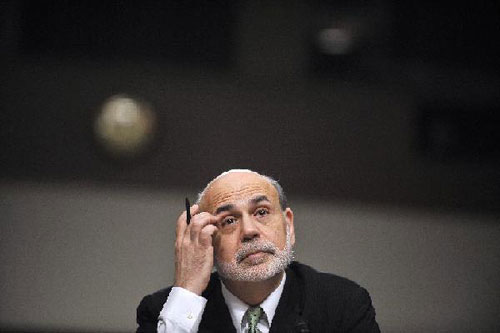U.S. Federal Reserve Chairman Ben Bernanke on Thursday warned that the escalating eurozone debt crisis and the looming U.S. fiscal cliff had posed significant risks to U.S. economic recovery, but gave no explicit hint of massive monetary steps to strengthen the tepid growth.
U.S. economic growth had continued at a moderate rate so far this year, and the nation's labor market conditions improved in the latter part of 2011 and earlier this year, Bernanke said in his testimony before the Joint Economic Committee of U.S. Congress.
U.S. economic growth appeared poised to continue at a "moderate pace" over coming quarters, supported in part by accommodative monetary policy, he said.
The economic activity in most U.S. regions expanded at a " moderate pace" from early April to May, with the manufacturing sector expanding in most areas and consumer spending flat, revealed a national economic survey released by the Fed on Wednesday.
However, the U.S.
central bank chief said concerns about sovereign debt and the health of banks
in a number of eurozone countries continued to create strains in global
financial markets. 
U.S. Federal Reserve Chairman Ben Bernanke testifies before the U.S. Congress Joint Economic Committee about the Economic Outlook on Capitol Hill in Washington D.C., capital of the United States, June 7, 2012. Bernanke on Thursday warned that the escalating eurozone debt crisis and the looming U.S. fiscal cliff posed significant risks to U.S. economic recovery, but gave no explicit hint of massive monetary steps to strengthen the tepid growth. (Xinhua/Zhang Jun)
"The crisis in Europe has affected the U.S. economy by acting as a drag on our exports, weighing on business and consumer confidence, and pressuring U.S. financial markets and institutions, " Bernanke said.
European policymakers had taken a number of actions to address the crisis, but more would likely be needed to stabilize eurozone banks, calm market fears about sovereign finances, achieve a workable fiscal framework for the euro area, and lay the foundations for long-term economic growth, he said.
On top of the simmering eurozone debt crisis, some domestic factors that had restrained the recovery still persisted, Bernanke cautioned.
U.S. households and businesses still appeared quite cautious about the economy. Concerns about developments in U.S. fiscal policy and the strength and sustainability of the recovery had left some firms hesitant to expand capacity. The depressed housing market had also been an important drag on the recovery, he said.
Inflation in the United States was expected to remain at or slightly below the 2 percent rate that the Federal Open Market Committee (FOMC), the Fed's interest rate setting panel, judges consistent with its statutory mandate to foster maximum employment and stable prices.
With tamed inflationary pressure and an anemic job creation pace, some economists were expecting the Fed to take new policy moves at its June 19-20 FOMC meeting to bolster the economic recovery.
"As always, the Federal Reserve remains prepared to take action as needed to protect the U.S. financial system and economy in the event that financial stresses escalate," Bernanke said, without specifying potential measures.
Monetary policy was not "panacea", while the economy's performance over the medium and longer term also would depend importantly on the course of the fiscal policy, Bernanke warned.
However, several high-ranking Fed officials including its vice chairman Janet Yellen said Wednesday that further monetary steps were needed to guard against an economic downturn.
As fiscal policymakers addressed the urgent issue of fiscal sustainability, a second objective should be to avoid unnecessarily impeding the current economic recovery, contended Bernanke.
"Indeed, a severe tightening of fiscal policy at the beginning of next year that is built into current law -- the so-called fiscal cliff -- would, if allowed to occur, pose a significant threat to the recovery," he added.
(VietNamNet/Xinhuanet)


























